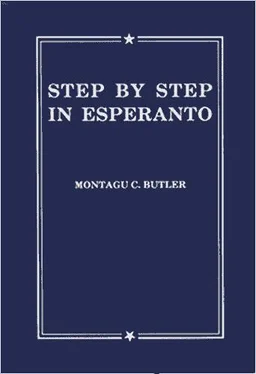270. PRI, about, concerning.
Li parolas pri Esperanto, He is speaking about (concerning, as-to, with-reference-to, with-regard-to, of, on) Esperanto .
Pri kio vi pensas? What are you thinking about?
Pri kiu vi timas? Whom are you afraid of?
Mi dubas( doubt ) pri tio.
271. De tempo al tempo mi pensas pri vi. Jes, efektive; en la tago mi revas( daydream ) pri vi, kaj en la nokto mi sonĝas pri vi. Inter generaloj parolu pri bataloj. En nia klaso ni lernas pri algebro, aritmetiko, arto, astronomio, botaniko,Esperanto, geografio, geometrio, historio, matematiko, muziko, kaj religio.
272. Ekzamenisto: “Kio estas via opinio pri la teoriode Darwin?” Kandidato: “Mitute konsentas kun la opinio de la lernolibro.”
“Se mi rigardas al vi, mi pensas pri Smith.” “Tio estas tre stranga, ĉar mi tute ne similas al li.” “Tamen, jes; li ŝuldas( owes, is in debt ) al mi, kaj ankaŭ vi ŝuldas al mi.”
La impertinenta demandanto. “Kiu estas tiu malbela virino?” “Ŝi estas mia edzino.” “Pardonu, vi ne komprenas: mi parolas pri tiu alia virino tie kun la ruĝa nazo!” “Tiu? Ho, ŝi estas mia filino!”
273. Answer some of the following questions: Pri kio(or, Pri kiu) vi diskutas( discuss )? batal- (disput- forges- ĝoj- hezit- insist-konsent- korespond-plend- plor- rid‑)as?
274. Demandu al mi primia nomo (la strato en kiu mi loĝas, la koloro de ŝiaj haroj, la nomo de tiu objekto, mia kato, miaj infanoj).
275. Make sentences, using some of the following roots with both al and pri:aŭskult, dir, fid, flustr, gratul, grumbl, help, instru, kant, konfes, kred, leg, pardon, parol, plend, predik, raport, respond, skrib, telefon, telegraf, E.g., protest: Mi protestas al mia estro pri mia troa laboro.
(a) Suggested variants: Kiu protestas …? Al kiu vi protestas …? Ĉu li protestas al vi …? Pri kio vi protestas …? Kial vi protestas …? Ĉu vi protestas tre ofte …?
(b) Suggested completions: … (pri) la afero, la fakto, lia demando, nia salajro, lia edzino, ŝia malbona skribo; the brown ants in my garden, our old typewriters, the size of his feet, the arrangement of the new chairs in the reading-room .
276. TRA, through . Ili pasas tra fajro kaj akvo, They pass through fire and water. La kanto sonas tra la silento, The song sounds through the silence. Tra la mondo iras forta voko, A mighty call is going through the world.
277. (a) Complete the following sentences: … comes through the air, lives … storm, shines … leaves, speaks … nose, travels … Switzerland, tunnels … earth, flies … trees, looks … window.
(b) La rivero fluas tra la tutaurbo (flows all through the city, through the whole city). He reads all through the book, runs through the whole school, travels all through Italy, wanders all through the school.
278. TRANS, Across, on-the-other-side-of, over (in this sense). Belaj rakontoj el trans la montoj, pretty tales from over the hills . Ne voku al mi de trans la strato, Don’t call to me from across the street . La transa domo, the house on-the-other-side.
279. (a) Trans la korto staras nia domo. Ŝi loĝas trans la rivero. Ili restas trans la maro. Li vagas trans montoj kaj maro.
(b) Across the field is a rose-garden. Stand and wait on-the-other-side-of the street. Scotland is there, across the valley.
280. KE= that, used as a link-word joining two sentences (a “conjunction”). Mi kredas, ke vi estas prava, I believe (that) you are right. Here kejoins the sentences Mi kredasand vi estas prava.
Mi scias, ke li loĝas tie, I know (that) he lives there. Mi bedaŭras, ke vi malsanas; I am-sorry (regret) (that) you are ill.
In English that is often omitted, but you must not omit the ke.Place a comma before ke, to divide the sentences.
281. Mi ĉial ĝojas, ke mi estas Esperantisto. Ĉu vi sentas, ke mi eraras? Nia opinio estas (ni opinias) ( It is-our-opinion, we think; ke tio estas ideo idiota. Kial vi supozas,ke tio ne estas ebla? Ŝi pretendas( claims ), ke ŝi estas reĝidino. Mi divenas( guess ), ke vi estas okjara.
Mi respektaslin tial, ke( because, for the reason that ) li estas tre modesta. ( Tial ke= a strong form of ĉar).
282. Tri gradojde mar-malsano. (1) Mi kredas, ke mi mortas. (2) Mi scias, ke mi mortas. (3) Mi timas, ke mi ne mortas.
“Ĉu vi opinias, ke mi estas idioto?” “Tute ne! Tamen eble mi eraras.”
283. (a) Make sentences using ke after some of the words bedaŭr- (dir- flustr- ĝoj- instru- juĝ- kompren- konfes- konsent- leg- lern- memor- opini- plend- predik- pruv- rakont- respond- rev- ripet- sci- sent- skrib- sonĝ- telefon- telegraf‑)as. Do not forget the comma.
(b) Complete the following sentences. Ne forgesu, ke … Memoru, ke … Ne respondu, ke … Kredu al mi, ke … Li ofte asertas,ke … Kial vi supozas, ke … Ĉu vi do timas, ke …? Ĉu vi vere suspektas,ke …?
284. This English word has many meanings, and must be translated accordingly. He says about that, that that “that” that is in your essay is wrong, Li diras pri tio, ke tiu“that”, kiu estas en via eseo, estas malĝusta.
285. She says (that) he is rich, but for-some-reason I do not suppose (that) that is true. Tell him (that) I am not a man of-that-kind. I feel (that) you are wrong on that matter. She asserts (that) she is right about that question. Do not believe that all that is in that book ts true. That proves the earth is round.
286. The translation of ke jes, ke ne,depends on the context.
Ĉu li estas tie?( Mi kredas, ke jes, I believe he is, I think so. Mi supozas, ke ne, I suppose he isn’t. I suppose not ).
Ĉu vi komprenas?( Mi timas, ke ne, I’m afraid not. I fear I don’t. Mi scias, ke jes, I know I do ).
287. Write similar questions and answers, using ke jes, ke ne, after some of the verbs asert-(bedaŭr- dir- esper- ĝoj- insist- konfes- konsent- kred- opini- ripet- sci- skrib- supoz- suspekt- telefon- tim- vid‑)as ( Compare 104– 105).
288. Al, apud, de, dum, en, inter, kun, por, pri, sen, sub, super, sur, tra, trans,are prepositions (96).
289. In English conversation we often end a sentence with a preposition, thus: “What are you sitting on? ” “Whom are you thinking of? ” [32]— in spite of the famous rule “A preposition is a word you must not end a sentence with ”! But in Esperanto you may NOT do this. Write, therefore: “ Sur kio vi sidas?” “ Pri kiu vi pensas?”.
Читать дальше












